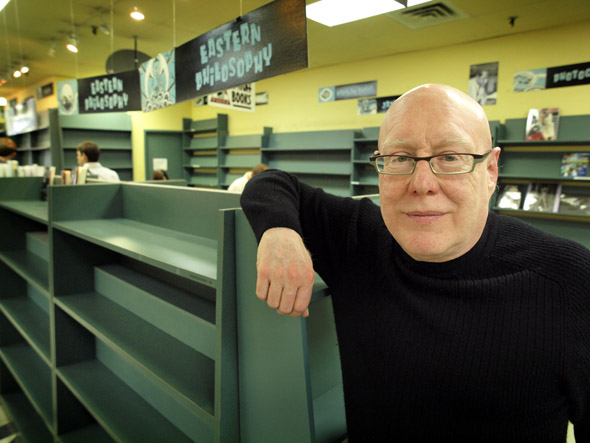
L’arroseur arrosé was the title of the 1895 Louis Lumière film which qualifies as the first-ever comedy and first-ever fiction film. The idea of the ‘Sprinkler Sprinkled’ has wide currency in French, but much less so in English. Nonetheless it applies this week on this blog to Marc Glassman, editor of POV Magazine, the excellent quarterly on documentary production.
Marc is also known as the editor of Montage and the moderator of many cultural events. (Plus, he used to own the best bookstore in Toronto, Pages, sadly missed.) Marc’s knowledge of cinema, literature and music is encyclopaedic.
I was recently interviewed by Marc for POV magazine – the interview appears in the current issue (you can also download it from my website here, just click on “POV interview” on bottom left). I was very impressed by Marc’s thoroughness: he leaves no stone unturned, even if the resulting interview has to be radically edited before publication.
So I thought I’d turn the tables and ask him about his interviewing techniques and experiences:
MG: I prepare a lot before I do a big interview. Generally, my interviews are either with filmmakers or authors, so I’ll go over bibliographies and filmographies in detail and, if I can, look again at a film or a book to remind me, in an emotional way, about their style and impact.
I used to prepare many questions but now I just think of points that I’d like to have discussed.
Tone is essential: I want the interviewee to be at ease, confident in my approach. When possible, I try to get more time than usually granted for interviews. I feel that the first ten minutes of any interview with a cultural figure is the same: the new work (whether it’s a film or a book or an installation) is hyped and certain specific “colourful” stories are told about difficult or funny moments in the creation of the piece. It’s only when you get time that you can go beneath the surface and find out what’s really happened to your interviewee.
The main thing? Listening! Patrick Watson, a brilliant interviewer, told me that. He said, “Listen to what someone is telling, and respond. Have a conversation.” That’s the key to a fine interview.
MI: Which were the most interesting interviewing experiences ?
Interviewing Jonas Gwangwa and other members of South African cultural sector of the ANC, Amandla!, when they visited Toronto on an anti-apartheid tour of Canada in the mid-80s. I recorded a concert, conducted multiple interviews and cut it all together into a 90 minute radio doc for Ryerson’s community channel, CKLN-FM. (To say I was overly ambitious is an understatement but I learned a lot and some people claimed to like it.)
Interviewing Spalding Gray, the actor and author. He was absolutely brilliant: funny and perceptive. I think I asked three questions in an hour.
Interviewing Quentin Tarantino, when he was at Toronto’s then Festival of Festivals with Reservoir Dogs. The energy coming off the man was indescribable. He was practically leaping off the walls with excitement.
Interviewing Nettie Wild, who is a truly great raconteur. She can hold you spellbound for an hour as she recounts story upon story. One of her doc friends in Vancouver should interview Nettie, film it, and cut it into a piece. Heck, I should do it!
MI: How does POV fit in with your other activities ?
The doc bug bit me when I was in my early twenties. At McGill, my film professor was John Grierson and he influenced me in profound ways, making me think long and hard about the effects media has on society—and what makes a good documentary. My love of literature and the arts in general derailed me from making docs the only focus in my working life, but it’s always one of my great loves. I’ve worked on docs, programmed docs, written and edited articles on docs and now I teach doc history at Ryerson.
Presently, I am the artistic director of a literary programme called This is not a Reading Series, which also features music and film and theatre; edit POV and the Directors Guild’s magazine Montage, broadcast film reviews for a local station, Classical 96.3 FM and expect to be back at Ryerson later in 2012. Docs are a major part of my life but I love balancing it with other artistic disciplines and pursuits.
Thanks to Tobi Elliott for help with this blog.